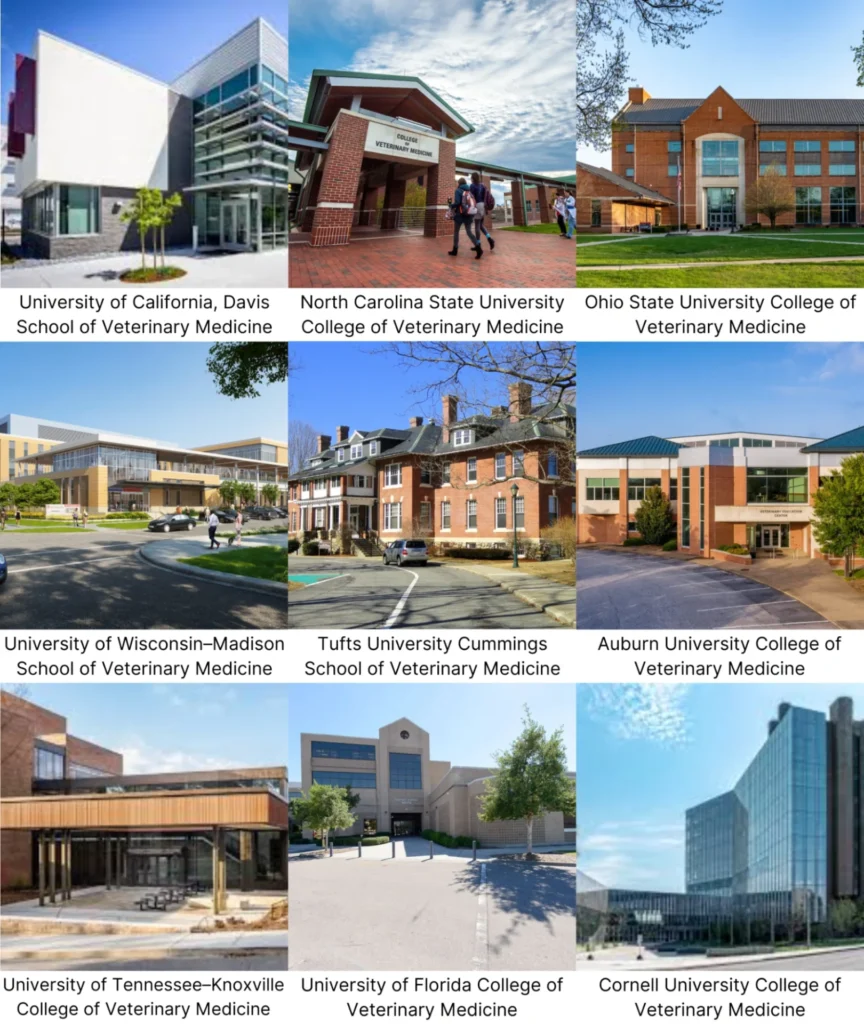About the Writer
Key Factors to Guide Your Vet School Program Choice

Choosing a veterinary program is a career-defining step. With so many options, it’s easy to focus on rankings or location and miss programs that better match your goals.
Your choice shapes your path – whether you decide to go for treating exotic animals, running a vet practice, or advancing research.
Key factors to guide your vet school choice:
- Self-Assessment
- Accreditation
- Curriculum & Specialties
- Clinical Experience
- Research Opportunities
- Faculty and Mentorship
- Facilities and Resources
- Location and Environment
- Cost and Financial Aid
- Admissions Process
- Campus Culture and Support
- Career Placement
Self-Assessment: Find Your ‘Why’
Veterinary medicine is a rewarding but demanding field. Understanding why you want to enter this profession is key to your future career success. Beyond the expected, it often entails long hours, emotional challenges, and managing both animals and their owners.
Becoming a veterinarian starts with clearly defining your goals and interests.
Veterinary medicine offers diverse opportunities – from working with exotic animals and livestock to running a clinic or advancing research. Take time to identify what excites you most. Each path will require specialized skills beyond general veterinary training.
For example, running a practice involves medical expertise and business skills, while wildlife conservation often entails remote fieldwork and collaboration.
Accreditation: Choosing a Credible Veterinary School

Accreditation ensures that a veterinary program meets high educational and professional standards. It also determines if graduates can take the licensure exam, which measures their knowledge and skills in veterinary medicine. In the U.S., the main exam is the North American Veterinary Licensing Examination (NAVLE).
Veterinary schools in the U.S. are accredited by the American Veterinary Medical Association (AVMA).
How can you check if a program is accredited?
You can find and download a list of AVMA-accredited veterinary schools on their official website.
One of the most well-known programs is the University of California, Davis School of Veterinary Medicine. It is a top AVMA-accredited school, recognized for its cutting-edge research, advanced facilities, and diverse clinical training.
Curriculum & Specialties: Tailor Your Education to Your Passion
A curriculum is the complete set of courses, training, and specializations in a veterinary program that provides the knowledge and skills needed for a career in veterinary medicine.
A veterinary program’s curriculum is the foundation of your education and should align with your career goals.
What should you look for?
Check the core science courses, such as anatomy and pathology, and look at the electives or specialized tracks that align with your interests.
For instance, North Carolina State University College of Veterinary Medicine offers tracks in companion animal medicine, food supply medicine, and equine medicine, allowing you to focus on areas like urban pet care, agricultural health, or equestrian medicine.
Degrees in the Veterinary Industry: Overview
Here’s a comparison of veterinary education and licensing in North America and South America, covering degree titles, study duration, admission requirements, accreditation, and licensing processes for veterinarians, veterinary technicians, and veterinary assistants.
| Factor | North America (U.S. & Canada) | South America (Brazil, Argentina, Chile, etc.) |
| Work Position: Veterinarian | ||
| Degree Name & Title |
|
|
| Duration of Study | 7-8 years (Pre-vet + 4-year DVM/VMD) | 5-6 years (Direct entry from high school) |
| Admission Requirements | Pre-vet courses, competitive entry, entrance exams (e.g., GRE) | High school diploma, national entrance exams |
| Accreditation | American Veterinary Medical Association (AVMA), Canadian Veterinary Medical Association (CVMA) | Varies by country |
| Licensing Process | North American Veterinary Licensing Examination (NAVLE) + State/Provincial Exams required | National licensing, fewer additional exams required |
| Work Position: Veterinary Technician/Veterinary Nurse | ||
| Degree Name & Title | Associate Degree in Veterinary Technology (2-year program) or Bachelor’s Degree in Veterinary Technology (4-year program) | No unified educational standard (varies by country) |
| Duration of Study | 2-4 years | 1-3 years |
| Admission Requirements | High school diploma, some programs require prerequisite courses | High school diploma, national entrance exams (varies by country) |
| Accreditation | American Veterinary Medical Association (AVMA) / Canadian Veterinary Medical Association (CVMA) | Varies by country, some programs affiliated with veterinary associations |
| Licensing Process | Must pass the Veterinary Technician National Exam (VTNE) | Certification not always required; some countries have national or regional exams |
| Work Position: Veterinary Assistant | ||
| Degree Name & Title | No formal degree is required. Many vet assistants receive on-the-job training. Some vocational schools, community colleges, and online programs offer certificate programs in veterinary assisting. | No formal degree or certification. Veterinary assistants typically learn through on-the-job training. |
| Duration of Study | typically 6 months to 1 year | – |
| Admission Requirements | High school diploma (some programs may not require it). | High school diploma (varies by program and country). |
| Accreditation | The National Association of Veterinary Technicians in America (NAVTA) offers the Approved Veterinary Assistant (AVA) certification, but it is not required to work in most states. | No unified accreditation. |
| Licensing Process | No national licensing exam. | No national licensing exam. |
Understanding these demands ensures your plans align with your goals and the realities of the field.
Clinical Experience: The Foundation of Hands-On Learning

Clinical training sets veterinary programs apart. Look for schools that offer hands-on experience through internships, externships, and specialized training.
For example, the Ohio State University College of Veterinary Medicine provides extensive clinical exposure at its Veterinary Medical Center, where students handle thousands of animal cases each year, building skills in diagnosis, surgery, and treatment.
Programs with unique opportunities, like working with exotic animals or wildlife reserves, can help align your education with your career goals. Strong clinical training ensures you can confidently apply your knowledge in real-world settings.
Research Opportunities: Shaping the Future of Veterinary Science
If you’re looking to explore a veterinary science path, go for a vet program with strong research opportunities and facilities.
The University of Wisconsin–Madison School of Veterinary Medicine is known for its advanced research and hands-on clinical training. It is home to UW Veterinary Care, a modern teaching hospital with high-tech labs and well-equipped classrooms. Students can work on meaningful projects in livestock nutrition, wildlife conservation, and disease prevention.
When comparing schools, look for programs with strong research funding, expert faculty, and top-tier facilities. Schools that focus on research will give you the skills, experience, and support to make real contributions to veterinary science.
Faculty and Mentorship: Learning from the Experts

The faculty at a veterinary school plays a key role in shaping your education and career further down the road.
Look for programs where professors have both academic expertise and clinical experience, as they can provide real-world insights and help connect theory to practice. Faculty who are accessible and offer mentorship can support you through challenges and career decisions.
At Tufts University Cummings School of Veterinary Medicine, accomplished faculty specialize in areas like equine medicine, animal behavior, and public health. They actively mentor students in research, clinical training, and career development.
A program with engaged professors ensures that you will receive guidance, build valuable connections, and be inspired to reach your full potential in veterinary medicine.
Facilities and Resources: Accessing the Tools for Success
One of the key features that sets veterinary schools in the U.S. apart is the quality of their facilities, including buildings, equipment, and technology. Look for institutions with well-equipped labs, libraries, and technology to prepare for real-world veterinary work.
For example, Auburn University College of Veterinary Medicine has modern diagnostic labs, surgical suites, and simulation labs, giving students hands-on training in a high-tech environment.
Having access to good libraries and digital resources also supports your learning. Schools with up-to-date facilities help you stay ahead in veterinary science and better prepare you for the real world.
Location and Environment: Finding Your Ideal Setting
Location matters when choosing a veterinary school. While personal preferences, like staying close to home or moving far away, play a role, it’s also important to think strategically.
The school’s location can impact your education and hands-on experience. Especially if it provides access to diverse clinical sites and wildlife or livestock facilities.
For example, the University of Tennessee–Knoxville College of Veterinary Medicine offers a mix of urban clinics and rural settings, giving students the chance to work with both pets and farm animals.
Think about whether you’d prefer a city, rural area, or a combination of both. The right location should match your career goals and offer the resources you need to succeed in veterinary medicine.
Cost and Financial Aid: Planning for Your Investment
Veterinary school is a major financial investment. Tuition is just one part of the cost. You’ll also need to factor in living expenses and the long-term benefits, such as salary and career stability.
For example, the University of Florida College of Veterinary Medicine charges around $28,000 per year for in-state tuition and offers scholarships, grants, and loan repayment programs to ease financial burdens.
When comparing programs, look for merit-based scholarships, work-study options, and loan forgiveness plans. Careful financial planning will help you choose a program that balances cost with quality.
Admissions Process: Your Roadmap to Veterinary School
Preparing for veterinary school admissions requires a clear understanding of prerequisites, including biology and chemistry coursework and a competitive GPA. Schools also value animal handling experience, such as volunteering at shelters or working in clinics, to show your commitment and readiness.
For instance, the University of Wisconsin–Madison School of Veterinary Medicine outlines specific coursework and encourages applicants to highlight relevant experience, leadership, and community involvement.
A strong application includes recommendation letters, a compelling personal statement, and attention to detail. Using tools like the Veterinary Medical College Application Service (VMCAS) can help streamline the process and ensure you stand out as a competitive candidate.
Campus Culture and Support: Thriving as a Student
When researching schools, consider factors like community atmosphere, extracurricular activities, and student support services. These resources can help you stay motivated, build connections, and grow professionally.
If possible, attend an open day or campus tour to get a feel for the environment before making your decision.
For example, the University of California, Davis School of Veterinary Medicine offers a collaborative culture with comprehensive support, including counselors, advisors, and mentorship programs.
Career Placement: Planning Beyond Graduation

There isn’t a single ranking system for career placement rates at U.S. veterinary schools, but you can still find useful data.
Many schools publish their own employment statistics, so checking their websites is a great starting point. For example, Ross University School of Veterinary Medicine shares its graduate employment outcomes, giving insight into job placements after graduation.
You can also explore AVMA (American Veterinary Medical Association) reports, which track employment trends and salary data for new veterinary graduates.
When researching schools, look for graduate employment rates, career support services, and alumni success stories. These factors can give you a better idea of how well a program prepares students for the job market.
The Evolving Veterinary Profession: Preparing for the Future
Veterinary medicine is constantly evolving with new technology, global health challenges, and interdisciplinary care. Choose schools that emphasize emerging fields like telemedicine, advanced diagnostics, and One Health initiatives to stay ahead.
Programs that focus on innovation, sustainability, and specialized care will prepare you to thrive in a rapidly changing profession.
Frequently Asked Questions: Your Veterinary Education Cheat Sheet
What is the best degree to get in vet med?
The Doctor of Veterinary Medicine (DVM) is the standard degree required to become a licensed veterinarian in the United States. To pursue a DVM, you’ll need a strong foundation in sciences through a bachelor’s degree in fields like biology, animal science, or zoology. If you’re considering a supporting role, a Veterinary Technician degree can lead to a career as a vet tech as its education length takes up to 2-3 years. For those interested in research or academia, advanced degrees like a Master’s or PhD in veterinary science or related fields are excellent options.
Which veterinary course is best?
The “best” veterinary course depends on your career goals. If you aim to become a licensed veterinarian, a Doctor of Veterinary Medicine (DVM) program is essential. Programs like those at North Carolina State University or Ohio State University are known for their comprehensive curricula and clinical training. A Veterinary Technician program may be ideal if you’re interested in a support role. For those pursuing research or public health, courses in One Health initiatives, wildlife health, or sustainable veterinary practices can provide specialized knowledge in emerging fields. Focus on courses that align with your passion and career aspirations.
Conclusion: Take the Next Step Toward Your Dream Career
Your veterinary career begins with choosing the right school.
Reflect on your values, aspirations, and what drives your passion for animal health. Align your choice with your goals to build a strong foundation for success.
Veterinary medicine requires planning, dedication, and the right resources. Every decision shapes your path. Use this guide to explore your options and stay focused on your dream.
The future of veterinary medicine is full of opportunities. However, with all the factors to consider, taking the first step toward making your vision a reality may feel overwhelming. Platforms like VetMed Match simplify the process of selecting the best veterinary schools and programs. Contact us and let our experts help you get your foot in the door of vet medicine.
